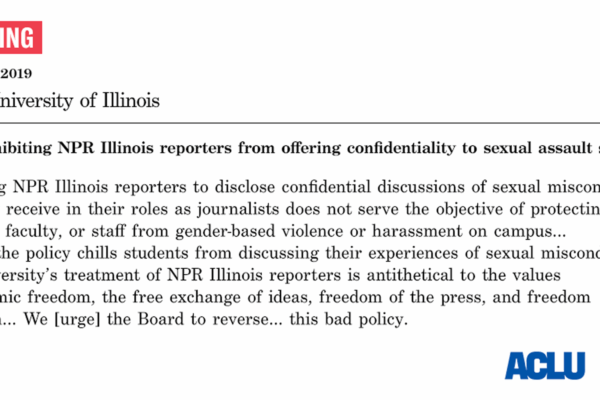A recently announced University of Illinois policy requiring reporters at NPR Illinois to disclose confidential conversations the journalists have with survivors of sexual harassment or assault is under fire. In a letter sent to University of Illinois Trustees, lawyers for the ACLU argue that efforts to force journalists to disclose these confidential conversations undermines free expression and freedom of the press and does not serve the objective of preventing gender-based violence or harassment on campus.
Administrators notified NPR Illinois reporters that they are “responsible employees” under the University’s Sexual Misconduct Policy just days after NPR Illinois reporters published a story titled Preserving the Reputations of Sexual Harassers, a story that raised concerns about how the University dealt with issues of sexual harassment and violence.
Raising questions about the impact of this new rule on the revelation of sexual harassment and violence, the letter argues that while it is critical to have a range of employees who are mandated to report sexual harassment and violence, “(i)t is crucial, however, to preserve the ability of those who have experienced harassment or assault to seek help and accountability confidentially, without setting off an investigation. Accordingly, many institutions, including the University of Illinois, exempt counselors and similar professionals from mandatory disclosures to ensure that survivors may seek confidential advice and support without triggering formal proceedings if they choose to do so.”
The letter also defends the need for NPR Illinois journalists to be able to act freely and consult confidential sources. In part, the letter reminds the Trustees that “(i)nformation from confidential sources is a crucial tool for gathering and disseminating the news.”
The ACLU raises questions about the timing of the new rule. Given that the new rule was announced for NPR Illinois journalists just days after a far-reaching story about sexual harassment on University of Illinois campuses, the ACLU says the timing raises a disturbing series of questions. Specifically, the letter suggests that “the mere suspicion that campus officials are suppressing journalism that is critical of them should be embarrassing for an institution that values the pursuit of the truth.”
The ACLU letter was sent to the Board of Trustees in advance of their meeting in Chicago on Thursday, November 14th. ACLU of Illinois Executive Director Colleen Connell is scheduled to address the Board on the issue at that time.
The letter was signed by Rebecca K. Glenberg, senior staff attorney, and Emily Werth, staff attorney, at the ACLU of Illinois. They were joined by Sandra S. Park, senior staff attorney and Rebecca Ojserkis, legal fellow, at the ACLU (National) Women’s Rights Project.
Stay Informed
Sign up to be the first to hear about how to take action.
By completing this form, I agree to receive occasional emails per the terms of the ACLU’s privacy statement.
By completing this form, I agree to receive occasional emails per the terms of the ACLU’s privacy statement.

